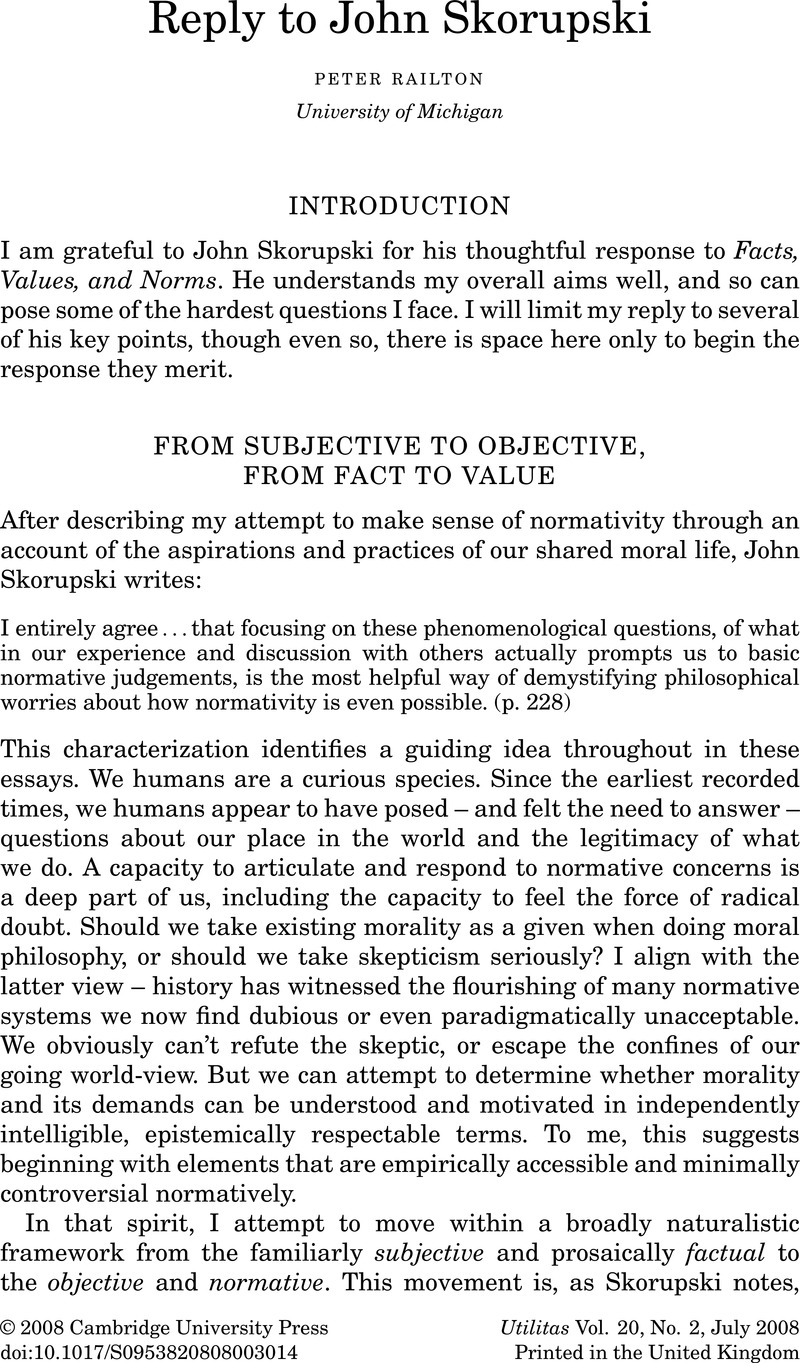Article contents
Reply to John Skorupski
Published online by Cambridge University Press: 01 June 2008
Abstract

- Type
- Reply
- Information
- Copyright
- Copyright © Cambridge University Press 2008
References
1 Page numbers in the text inserted in square brackets refer to my book, Facts, Values, and Norms (Cambridge, 2003); page numbers inserted in parentheses refer to John Skorupski's critical notice (this issue).
2 I therefore would reject Skorupski's suggestion that, for me, ‘the truth-maker for the proposition that I have reason to X is the fact that X-ing would advance my aims’ (p. 227).
3 In fact, I borrow the formulation (M/E) from Thomas Nagel, The Possibility of Altruism (Princeton, 1970), p. 33. See also Aristotle, Nicomachean Ethics, 1112b13.
4 ‘Belief’ and ‘desire’ in (B/D) are to be understood in the loose, encompassing manner now common in philosophy, as covering a wide range of conscious and non-conscious cognitive and conative states. Thus, implicit trust and unacknowledged suppositions count as beliefs, and devotion to the moral law and intrinsic valuing count as desires. ‘Prima facie’ is used in many different ways by philosophers. Herein it will by stipulation be understood as ‘default, defeasible’. Interestingly, something like (B/D) may be true without argument for those who analyze desire as a judgment or appearance of desirability, or belief as a judgment or appearance of credibility. However, I will need to argue for (B/D) because I reject these accounts. See my ‘Kant Meets Aristotle Where Reason Meets Appetite’, Argument und Analyse, ed. C. U. Moulines and Karl-Georg Niebergall (Paderborn, 2002).
5 In epistemology, this is known as the ‘principle of total evidence’.
6 Here I simplify, of course. The full account involves higher-order attitudes as well. Even so, Skorupski has reason to be doubtful. ‘The problem is we don't know whether [the ideally informed individual A+] would have any desires about A's wants as he actually is.’ What's wanted from A+, however, is not what A+ himself desires with respect to what A is to want. Neither is it ‘what A+ would want if he had A's good at heart’. (8) Rather, it is what A+ would want to want in the hypothetical circumstance of finding himself in A's shoes, stuck with living the rest of A's life. A+ will not be indifferent regarding what he wants to want in such circumstances.
7 Skorupski asks, appropriately, just what sort of value this is. Is it well-being? Or something else? And is it the value that morality should take into account when assessing her situation or counting her welfare? These questions require us to distinguish the value of a life for the person who leads it (which most closely corresponds to well-being) from the values realized through a life (which most closely corresponds to what, from the standpoint of the agent, gives her life significance and worth). Morality takes both into account, though in different ways and with respect to different attitudes. Speaking roughly, questions of justice and benevolence concern the first, while questions of personal respect and self-respect concern the second. For further discussion, see my ‘Cost-Benefit Analysis as a Source of Information about Welfare’, Valuing Health Risks, Costs, and Benefits for Environmental Decision Making, ed. P. Brett Hammond and Rob Coppock (Washington, D.C., 1990).
8 David, Hume, ‘Of the Standard of Taste’, David Hume: Essays Moral, Political, and Literary, ed. Miller, E. F. (Indianapolis, 1987), p. 235Google Scholar. He also writes that the sentiment of beauty ‘marks a certain conformity or relation between the object and the organs or faculties of the mind’ (p. 230).
9 John, Stuart Mill, ‘On Liberty’, John Stuart Mill: Utilitarianism and Other Essays, ed. Warnock, M. (New York, 1962)Google Scholar.
10 Recent empirical work on ‘optimal experience’ draws upon a similar idea of the inherently compelling, intrinsically rewarding experience of ‘finding fit’ between activities and fully utilized human capacities. See Optimal Experience, ed. M. Csikszentmihaly and I. S. Csikszentmihaly (Cambridge, 1988). Similar work has been done in neurophysiology and comparative psychology concerning universals in aesthetic appreciation. See the special issue on music of Nature Neuroscience 6 (2003).
11 Here my views converge with those of Thomas Nagel in The Possibility of Altruism, ch. 12, and The View from Nowhere (Oxford: Oxford University Press, 1986), ch. 8. Of course, I believe this objective standpoint is best characterized by a valoric consequentialist understanding of the touchstone of morality; Nagel's interpretation is more Kantian.
12 Bernard, Williams, ‘Internal and External Reasons’, in Moral Luck (Cambridge, 1981), pp. 102fGoogle Scholar.
13 Wittgenstein, I believe, takes just this sort of line on the nature of the logical must. He credits the basic idea to Ramsey. See L. Wittgenstein, Philosophical Investigations, trans. G. E. M. Anscombe (London, 1953), § 38. For discussion, see my ‘Wittgenstein on the Normativity of Logic’, New Essays on the A Priori, ed. P. Boghossian and C. Peacocke (Oxford, 2000).
14 This echoes the time-honored distinction between a condition for a requirement and a conditional requirement.
- 1
- Cited by




